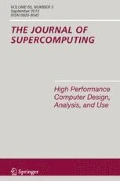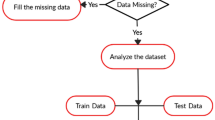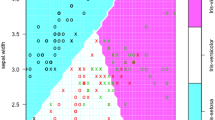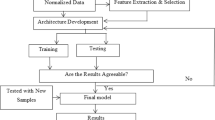Abstract
In this article, the clinical decision support system is discussed under the weighted fuzzy rule approach and genetic algorithm for computer-aided heart disease determination. The problem of feature selection is solved by the answers formulated from the stochastic inquiry from the genetic algorithm. In this, the weighed fuzzy framework is built by the application of certain major highlights selected from the datasets. In this, the proposed framework adopted favorable positions by the fuzzy rule strategy and the leaning of the fuzzy approach is being successful by the application of offered weighed methodology activity. At last, the risk forecasting outcomes from the experimentation on UCI machine learning source and supercomputing techniques are assured in our proposed clinical decision support system is enhanced essentially when contrasted with other frameworks in terms of sensitivity specificity, sensitivity, and accuracy.












Similar content being viewed by others
Change history
14 February 2024
This article has been retracted. Please see the Retraction Notice for more detail: https://doi.org/10.1007/s11227-024-05969-2
References
Dewan A, Sharma M (2015) Prediction of heart disease using a hybrid technique in data mining classification. In Computing for Sustainable Global Development, pp. 704–706
Toloueiashtian M, Motameni H (2018) A new clustering approach in wireless sensor networks using fuzzy system. J Supercomput 74:717–737. https://doi.org/10.1007/s11227-017-2153-0
Bhatla N, Jyoti K (2012) An analysis of heart disease prediction using different data mining techniques. Int J Eng 1(8):1–4
Vega-Rodríguez MA, Santander-Jiménez S (2019) Parallel computing in bioinformatics: a view from high-performance, heterogeneous, and cloud computing. J Supercomput 75:3369–3373. https://doi.org/10.1007/s11227-019-02934-2
Barretta A (2008) The functioning of co-competition in the health-care sector: an explorative analysis. Scand J Manag 24(3):209–220
Vivekanandan T, Iyengar NCSN (2017) Optimal feature selection using a modified differential evolution algorithm and its effectiveness for prediction of heart disease. Comput Biol Med 90:125–136
Vega A, Porteny T, Aguila E (2018) The role of clinics in determining older recent immigrants use of health services. J Immigr Minor Health 20(6):1468–1475
Akbari R, Ziarati K (2011) A multilevel evolutionary algorithm for optimizing numerical functions. Int J Ind Eng Comput 2(2):419–430
Von Krogh G (2012) How does social software change knowledge management? Toward a strategic research agenda, The Journal of Strategic Information Systems 21(2):154–164
Askari S, Montazerin N (2015) A high-order multi-variable fuzzy time series forecasting algorithm based on fuzzy clustering. Expert Syst Appl 42(4):2121–2135
Anbarasi M, Anupriya E, Iyengar NCSN (2010) Enhanced prediction of heart disease with feature subset selection using genetic algorithm. Int J Eng Sci Technol 2(10):5370–5376
Kumar S, Sahoo G (2015) Classification of heart disease using naive bayes and genetic algorithm. Int J Comput Intell Data Min 2:269–282
Fan CY, Chang PC, Lin JJ, Hsieh JC (2011) A hybrid model combining case-based reasoning and fuzzy decision tree for medical data classification. Appl Soft Comput 11(1):632–644
Gosain A, Dahiya S (2016) Performance analysis of various fuzzy clustering algorithms: a review. Procedia Comput Sci 79:100–111
Warren J, Beliakov G, Zwaag B (2000) Fuzzy logic in clinical practice decision support system. In: Proceedings of the 33rd Hawaii International Conference on System Sciences, Maui, Hawaii. 4–7 January
Anooj PK (2012) Clinical decision support system: risk level prediction of heart disease using weighted fuzzy rules. J King Saud Univ-Comput Inf Sci 24(1):27–40
Babatunde O, Armstrong L, Leng J, Diepeveen D (2014) Zernike moments and genetic algorithm: tutorial and application. Br J Math Comput Sci 4(15):2217–2236
Herland M, Khoshgoftaar TM, Wald R (2014) A review of data mining using big data in health informatics. J Big data 1(1):2–7
Lobach D, Sanders GD, Bright TJ, Wong A, Dhurjati R, Bristow E, Bastian L (2012) Enabling health care decision-making through clinical decision support and knowledge management. Evid Represent Technol Assess 203(203):1–784
Jeong YS, Hassan H, Sangaiah AK (2019) Machine learning on big data for future computing. J Supercomput 75:2925–2929. https://doi.org/10.1007/s11227-019-02872-z
Bala Sundar V, Devi T, Saravan N (2012) Development of a data clustering algorithm for predicting heart. Int J Comput Appl 48:423–428
D’Agostino RB, Vasan RS, Pencina MJ, Wolf PA, Cobain M, Massaro JM (2008) General cardiovascular risk profile for use in primary care. Framingham Heart Study Circ 117(6):743–753
García-Saiz D, Zorrilla M, Bosque JL (2017) A clustering-based knowledge discovery process for data centre infrastructure management. J Supercomput 73:215–226. https://doi.org/10.1007/s11227-016-1693-z
Dangare CS, Apte SS (2012) Improved study of heart disease prediction system using data mining classification techniques. Int J Comput Appl 47(10):44–48
Ephzibah EP (2010) Cost effective approach on feature selection using genetic algorithms and LS-SVM classifier. IJ CA Special Issue Evolut Comput Optim Tech 55:55–56
Dangare C, Apte S (2012) A data mining approach for prediction of heart disease using neural networks. Int J Comput Eng Technol 3(3):30–40
Nazari S, Fallah M, Kazemipoor H, Salehipour A (2018) A fuzzy inference-fuzzy analytic hierarchy process-based clinical decision support system for diagnosis of heart diseases. Expert Syst Appl 95:261–271
Yanwei X, Wang J, Zhao Z, Gao Y (2007) Combination data mining models with new medical data to predict outcome of coronary heart disease, Proceedings International Conference on Convergence Information Technology, pp. 868–72
Acknowledgements
This project was funded by the Deanship of Scientific Research (DSR), King Abdulaziz University, Jeddah, under grant no. (G: 251-135-1441). The authors, therefore, acknowledge with thanks DSR for technical and financial support.
Author information
Authors and Affiliations
Corresponding author
Additional information
Publisher's Note
Springer Nature remains neutral with regard to jurisdictional claims in published maps and institutional affiliations.
This article has been retracted. Please see the retraction notice for more detail: https://doi.org/10.1007/s11227-024-05969-2"
Rights and permissions
Springer Nature or its licensor (e.g. a society or other partner) holds exclusive rights to this article under a publishing agreement with the author(s) or other rightsholder(s); author self-archiving of the accepted manuscript version of this article is solely governed by the terms of such publishing agreement and applicable law.
About this article
Cite this article
Hameed, A.Z., Ramasamy, B., Shahzad, M.A. et al. RETRACTED ARTICLE: Efficient hybrid algorithm based on genetic with weighted fuzzy rule for developing a decision support system in prediction of heart diseases. J Supercomput 77, 10117–10137 (2021). https://doi.org/10.1007/s11227-021-03677-9
Accepted:
Published:
Issue Date:
DOI: https://doi.org/10.1007/s11227-021-03677-9




